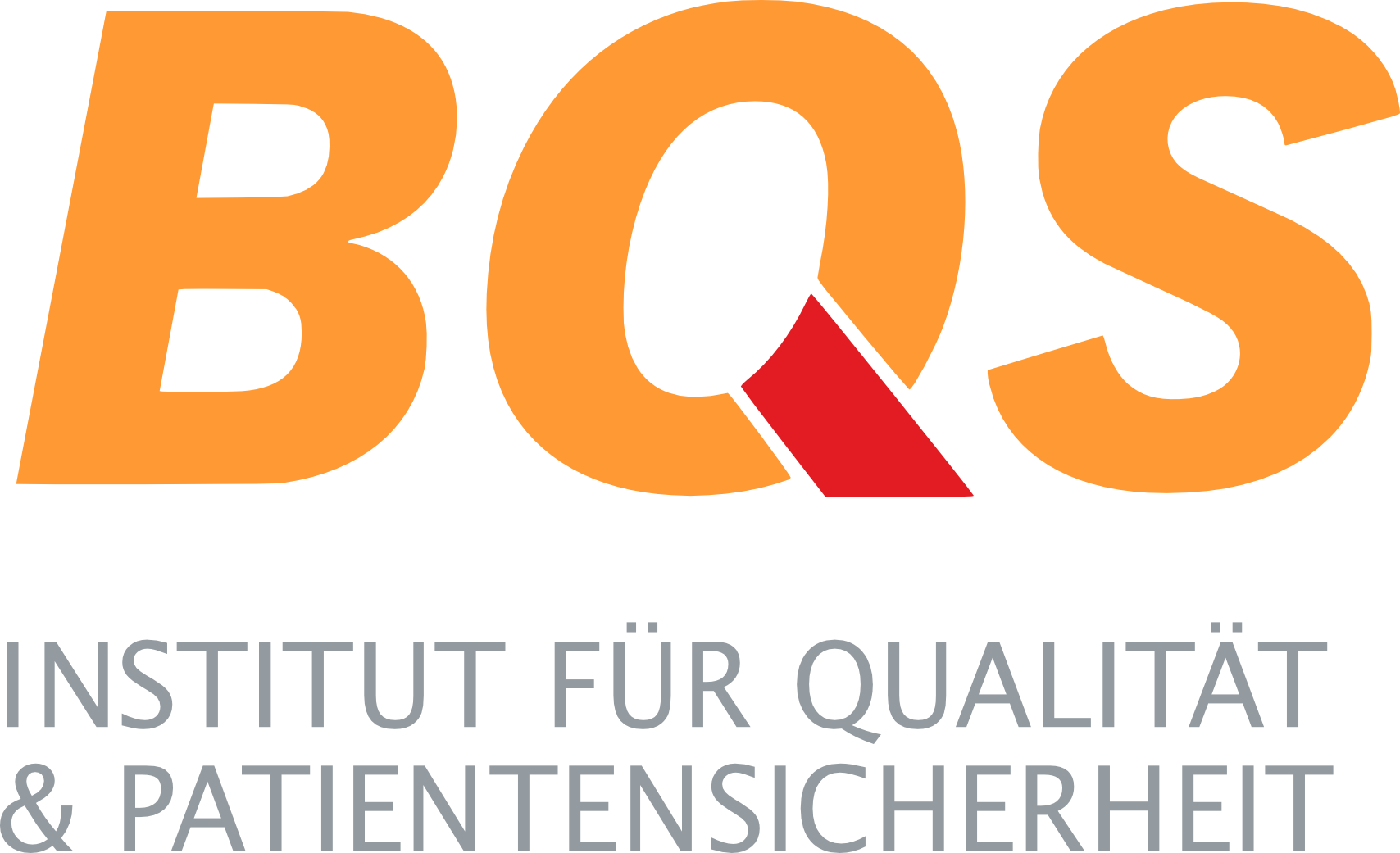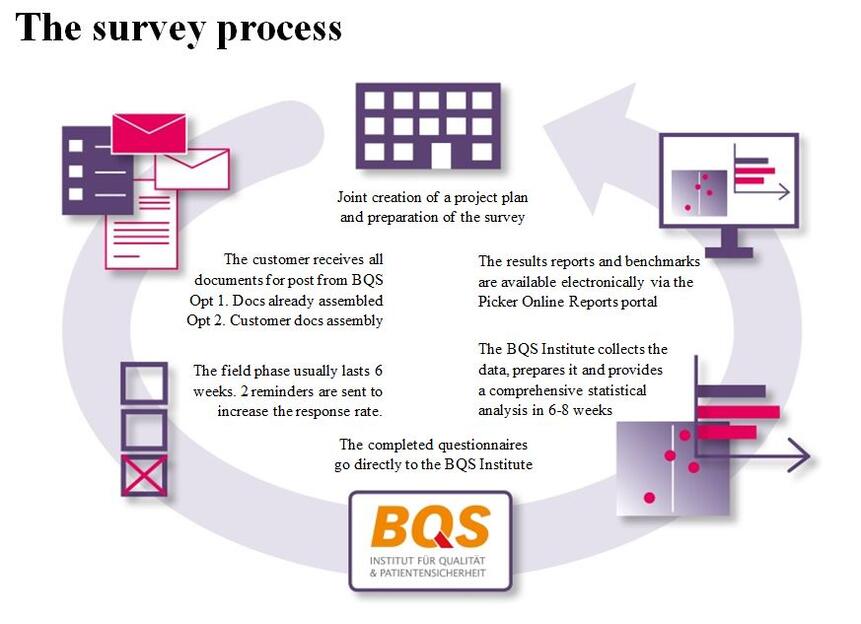Patient surveys in the hospital
A patient's honest feedback provides valuable information for a hospital, both to identify acute service shortcomings and to then respond accordingly. For instance, substantiated criticism can become the foundation for long overdue action measures, while positive feedback is a great motivator for the entire staff.
The questions developed by Picker are based on key quality indicators and situations from the patient's perspective, which were described by focus group participants and others, or emerged from feedback provided by pilot survey participants. Each question captures a very specific part of the respondent's experience in the respective care process. Due to the event-focused questioning (e.g. "Did this happen...?") and their specificity, individual circumstances and influences (such as expectations, bias, conceivability, tendency to say yes, fear of personal disadvantage, etc.) can be largely minimized..
The questions are constructed in such a way that they correlate consistently (i.e., independent of individual influences and circumstances on the patient's side) if, with regard to the assessed process, a "good" or "poor" performance was provided by the assessed department from the patient's point-of-view. The event-oriented questioning does not completely exclude the inclusion of some value judgment questions ("ratings"). However, reporting questions ("reportings") make up the bulk of the questionnaire.
Unlike conventional satisfaction analyses, the Picker method focuses on problem frequencies and is accordingly not a satisfaction survey, but a problem-oriented survey. The problem frequencies identified from the results serve as an indication of potential for improvement.
In our view, a problem-orientated approach best identifies the areas in which patients and employees as well as the facilities themselves would benefit from improvement measures. This approach also provides a good overview of how individual hospitals compare internally and externally. In addition, repeated surveys allow developments over time to be quickly observed.
Video: Our contribution to improving patient safety in hospitals
Aim of the patient surveys
The goal of the Picker Patient Survey is to use scientifically based instruments and methods to provide a status-quo description of the quality of care from the patient's perspective, as well as to identify priority areas for quality development and improvement. The Picker Inpatient Care Questionnaire is based on the Picker Institute Boston Acute Inpatient Care Questionnaire. It was developed through an elaborate scientific process as part of the Picker/Commonwealth Program for Patient Centered Care with participation from Harvard Medical School.
Implementation of the patient surveys
In cross-sectional surveys, patients are interviewed after discharge or after a course of treatment, because:
- the overall performance, e.g. the total stay in a hospital, can only be fully assessed in retrospect
- patients during treatment are often highly (emotionally) stressed and preoccupied with the course of their illness, too ill or adversely affected by medication and thus are not best able to make balanced judgments
- patients answer more honestly and critically in retrospect and with a certain time lag, thus preventing the otherwise strong positive bias due to the above-mentioned influencing factors
- By integrating this time delay, a credible separation of "interviewer" and service provider is created whereby less biased, more honest answers are guaranteed.
It's possible to choose between the classic inpatient questionnaire and the short questionnaire for surveys. In the case of continuous patient surveys and quarterly surveys, a full survey is for instance conducted with the goal of being able to react immediately to problem occurences. Since the general conditions and rationale are different for this type of survey, it is also possible to conduct an in-house survey.
Online patient surveys
In addition to the classic paper-based method, online questionnaires can be used for surveys and can, if necessary, be additionally supplemented by paper questionnaires (hybrid).
Conducting an online survey differs only in that patients are contacted by e-mail and can participate in the survey via a web portal. The advantages of this option include that it's simple to complete, ensures particularly high data quality and provides cost savings for your institution.
Results of the patient surveys
Thanks to our extensive benchmark database, you can benefit from valuable comparison reports and benchmarking. We offer detailed comparison reports based on your individual information needs.
The aim of the surveys is to identify clear priorities for quality improvement from the patients' perspective (based on the ranking of problem frequencies) and thus to initiate quality-enhancing projects. It makes sense to discuss the results of a survey with the relevant staff (e.g., with quality improvement management) in order to understand the context and possible causes, and to accordingly plan suitable short-, medium- and long-term quality development measures.
In view of resource constraints, it makes sense to start where
- high problem frequencies have been measured overall or in an external comparison, or
- significant increases in problem frequencies have been observed in comparison to existing previous surveys with Picker, or
- particularly acute problems and situations have been reported in free texts.
Picker Online Reports
For the provision of results we use our unique reporting system Picker Online Reports. With this web-based system, you can flexibly access your personal account via the Internet to retrieve and download your result reports. Within the scope of a dynamic user license, you can benefit from further design and filtering options, create additional users, and create and process your own reports.
Patient questionnaires and additional modules
The following picker questionnaire types are available for the surveys.
- Inpatient Care Questionnaire
- Parent questionnaire for pediatric patients
- Parent questionnaire for neonatological patients
- Questionnaire for obstetric patients
- Questionnaire for geriatric patients
- Questionnaire for psychiatric patients
- Questionnaire for Rehabilitation
- Questionnaire for adult outpatients
- Questionnaire for pediatric outpatients
- Optional module: additional questions on patient safety
- Optional module: additional questions on pastoral care
- Optional module: additional questions on therapists (physiotherapy, occupational therapy, speech therapy)
- Optional module: additional questions on complaint management
- Optional module: questionnaire for tumor centers (only in combination with the questionnaire for inpatient care or the parent questionnaire (pediatrics)
Would you like to learn more about surveys which use the Picker method?
... or are you planning a patient survey for your hospital? Then contact us. We will be happy to support you in the planning, implementation and follow-up of the survey.
Please contact:
E-Mail: pckr-vltnnbqsd
Phone: +49 40 25 40 78 40



